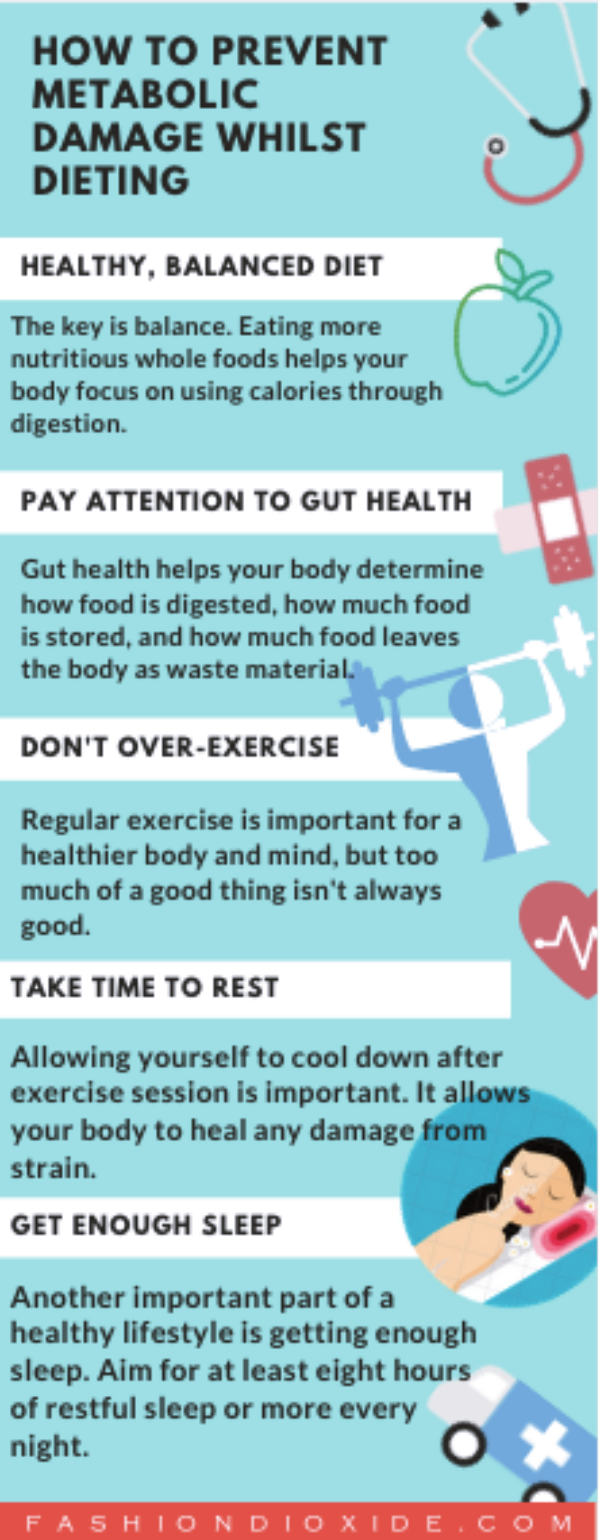There are many reasons why people decide to go on a diet. Besides the desire to shed some extra pounds, people opt for dieting to help lower their blood pressure, reduce their risk for heart disease and diabetes and improve their overall cholesterol ratio. Dieting can also make people feel happier and more confident about themselves.
Dieting can be a great health advantage, but there are different needs for every person. Talk to your doctor or health care provider before starting any kind of diet. You may also want to get a physical test to see where you’re at in terms of ideal weight for your height. If you have any current illness or other health concerns, make sure that any kind of diet takes those considerations into effect.
How to Prevent Metabolic Damage Whilst Dieting

There can also be some risks associated with long-term dieting. It may be easier for weight lost during a diet to be regained. Certain diets may lack essential vitamins and nutrients that we need every day. Other potential hazards include possible metabolic damage and eating disorders.
Metabolic damage can be described as a situation where a person’s body adapts to the effects of long-term calorie deficit or deprivation. It is also referred to as “starvation mode.” Here are a few ways to prevent metabolic damage while dieting:
- Concentrate on a healthy, well-balanced diet.

You don’t necessarily have to always limit yourself to a certain number of calories or cut certain foods completely out of your diet. You can still enjoy the foods you love and you can still splurge once in a while too. The key is balance. Eating more nutritious whole foods helps your body focus on using calories through digestion. You may want to talk to your health care provider or enlist the services of a dietitian. They can prescribe a diet of foods that are full of the vitamins, minerals, antioxidants and other nutritional content that your body needs to make it through the day.
- Pay attention to gut health.

Gut health is becoming more of a concern for many people every day. It’s important in terms of both your metabolism and your overall physical health. Gut health helps your body determine how food is digested, how much food is stored, and how much food leaves the body as waste material. For a healthier gut and healthier metabolism, many experts recommend staying away from yo-yo or other fad diets. In many cases, they also suggest increasing your protein intake, because protein usually helps you feel fuller. Eat regular meals or snacks every three to four hours that you are awake, and avoid sugary or processed foods whenever possible, as they require very little digestive effort. In case you are unable to control deteriorating gut health, visit a doctor. For any required medication, get Canadian prescription drugs online to save money.
- Don’t over-exercise.

Regular exercise is important for a healthier body and mind, but too much of a good thing isn’t always good. Over-exercise can prevent you from achieving the results you want to see. If you’re feeling the effects of metabolic issues, it’s time to rein in your activities a bit. Reduce repetitions or decrease the amount of time that you exercise to give your body time to catch up. You can still exercise, but keep it in moderation. After a while, you may even start to see improvements in your energy and muscle mass.
- Take time to rest.

Allowing yourself to cool down after each exercise session is important. It allows your body to heal any damage from strain or overexertion. If you’ve been battling with stress, anxiety or depression, schedule some time every day for things that can relax both your body and mind. You can meditate for a while, listen to some relaxing music or read a good book, or even practice a few yoga poses or enjoy some mild stretching exercises. These activities and others can help you focus on positive thoughts and help you to keep your mind off of the things that caused you stress in the first place.
- Get enough sleep.

Another important part of a healthy lifestyle is getting enough sleep. Aim for at least eight hours of restful sleep or more every night. Make sure that your phone, lights or anything else that could be distracting is turned off. Some people take a nice relaxing bath or drink a glass of warm milk before bed to help them get to sleep faster. You should also avoid any stressful activities before bed. Your body needs enough rest to heal from illness and injuries. You also need plenty of sleep so that you can awake each morning feeling refreshed and ready to take on a new day.
Common symptoms of metabolic dysfunction include constipation, gas, bloating, reduced energy, increased hunger and changes in sleep patterns and mood. If you experience any of these symptoms for an extended period of time, consult your doctor immediately. Dieting has been proven to help many people lose weight and keep pounds off, but just remember that you should be taking in more calories than you’re burning off every day. You may want to start a calorie counter for both your food intake and your calories burned through regular exercise. After enough time, you should be able to find a solution that meets your personal needs. Balance and moderation are essential to a healthy life.

Reply